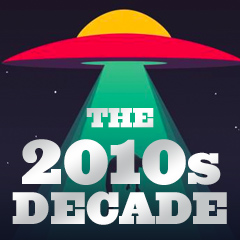|
Erotic Cinema:
E. L. James' 2011 trashy, erotic romance novel Fifty
Shades of Grey, which sold over 100 million copies worldwide, was
adapted into three films, beginning with director Sam Taylor-Johnson's
controversially-sexy film, Fifty
Shades of Grey (2015). It was a highly-anticipated
pop cultural phenomenon about a sado-masochistic relationship. It starred
Dakota Johnson as assistant literary editor Anastasia 'Ana' Steele
and Jamie Dornan as charismatic Seattle billionaire sadist Christian
Grey. Before its Valentine's Day release in 2015, the movie sold more
advanced tickets than any other R-rated movie in history, and it was
the widest R-rated opening ever (at over 3,600 theatres). It eventually
earned $166.2 million (domestic), and a whopping $570 million (worldwide).
It became one of Universal Pictures' highest grossing R-rated international
releases, topping Universal's previous original R-rated comedy, Ted
(2012) (at
$549.4 million).
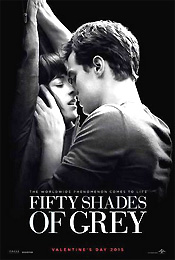
Fifty Shades of Grey (2015)
$166.2 million (domestic)
$570 million (worldwide)
Budget: $40 million
|
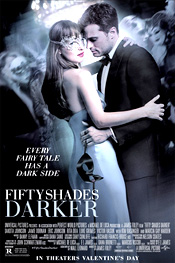
Fifty Shades Darker (2017)
$114.6 million (domestic)
$377 million (worldwide)
Budget: $55 million
|

Fifty Shades Freed (2018)
$100.4 million (domestic)
$372 million (worldwide)
Budget: $55 million
|
The initial movie, with production costs of $40 million,
attracted an audience that was overwhelming female. It was clear that
the film would spawn a few sequels - unusual for Hollywood which had
recoiled for years from films about sex. Its effective advertising slogan
was "Are
You Curious?", although most of its reviews were critical and
unfavorable. Initially, it was quite a phenomenon at the box-office
(especially internationally), but then faltered due to horrible reviews
and weak word-of-mouth.
An erotic, glittery drama
sequel, Fifty Shades Darker (2017) was directed
by James Foley, and was also released around Valentine's Day. Its taglines
were: "Every
Fairy Tale Has a Dark Side" and "Slip Into Something a Shade
Darker." A
sequel followed the next year in February of 2018: Fifty Shades
Freed: The Final Chapter (2018), directed again by James Foley, with
the tagline: "Don't Miss the Climax."
Two 'chick-flick' movies featuring hunky, bare-assed male
strippers in a dance revue did well in the decade:
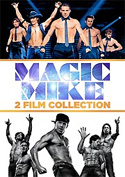 Magic Mike (2012), director Stephen Soderbergh's
slick drama, famous for its male strip routines, starring Channing
Tatum (as roofer Mike), who worked three days a week as the lead dancer
at a Tampa strip club known as Xquisite, with Matthew McConaughey
as the club's impressive boss Dallas wearing black leather pants -
[Note: the film's story was based on actor Tatum's brief real-life
experiences as a stripper in a Florida club in the late 1990s, stage-named
Chan Crawford] Magic Mike (2012), director Stephen Soderbergh's
slick drama, famous for its male strip routines, starring Channing
Tatum (as roofer Mike), who worked three days a week as the lead dancer
at a Tampa strip club known as Xquisite, with Matthew McConaughey
as the club's impressive boss Dallas wearing black leather pants -
[Note: the film's story was based on actor Tatum's brief real-life
experiences as a stripper in a Florida club in the late 1990s, stage-named
Chan Crawford] - Magic Mike XXL (2015), an inevitable raunchy
sequel by director Gregory Jacobs, with Tatum reprising his role as
'Magic Mike.' It was three years later, after Mike had quit as a stripper
and taken up his own furniture business, but met up with his "Kings
of Tampa" buddies for one last performance on a road trip to the
Strippers' Convention in Myrtle Beach, South Carolina, a show MC'd
by Paris (Elizabeth Banks)
There were two other mainstream, erotic romantic comedy/dramas,
and at least four other foreign entries in the sub-genre:
- Blue Valentine (2010), by director Derek Cianfrance;
the downbeat, indie romantic drama about a working-class marriage in
rural eastern Pennsylvania over a six-year period was between two struggling
spouses: Cindy Heller (Michelle Williams), a
medical assistant, and Dean Pereira (Ryan Gosling), a
charming blue-collar worker/slacker; all of the frankly-depicted
sex scenes between the two stars were non-explicit, discreetly shot,
and non-gratuitous
- Love & Other Drugs (2010), by director Edward
Zwick; this mainstream romantic comedy was very frank to display
such abundant nudity, especially from its up-and-coming young female
star (Anne Hathaway); in the story, handsome,
smooth-talking, womanizing Pfizer pharmaceutical-sales
representative Jamie Randall (Jake Gyllenhaal) fell in love with Maggie
Murdock (Hathaway), a free-spirited 26 year-old artist/diner waitress
suffering from Parkinson's disease
 Shame (2011, UK), from British director Steve
McQueen - it was a powerful yet dark NC-17 rated sex addiction film
about NYC businessman Brandon Sullivan (Michael Fassbender), who suffered
from a serious problem or obsession - with sex; it never portrayed
pornographic sex, and the sex itself was quite joyless, shameful and
self-destructive Shame (2011, UK), from British director Steve
McQueen - it was a powerful yet dark NC-17 rated sex addiction film
about NYC businessman Brandon Sullivan (Michael Fassbender), who suffered
from a serious problem or obsession - with sex; it never portrayed
pornographic sex, and the sex itself was quite joyless, shameful and
self-destructive- Blue is the Warmest Color (2013, Fr.) (aka
La Vie d'Adèle – Chapitres 1 et 2) -
writer/producer/director Abdellatif Kechiche's NC-17 rated
(for "explicit sexual content")
three-hour French drama won the Palme d'Or at the Cannes Film Festival,
for its portrayal of a lesbian relationship between
teenaged, 15 year-old high-school student Adèle (Adèle
Exarchopoulos) and blue-haired collegiate Fine Art student Emma
(Léa Seydoux)
- Nymphomaniac Vol. 1-2 (2013-2014), controversial
director Lars von Trier's unrated two-part drama was the recounting
of the erotic sex life of 42 year-old, self-proclaimed, insatiable "nymphomaniac"
(or "sex-addict'') Joe (Charlotte Gainsbourg); the sexually-explicit
films (four hours in length for the censored version and 5 1/2 hours
for the Director's Cut) in the exhausting two-part epic, although mostly
tame and simulated, were immediately labeled as 'pornographic'
- Love (2015, Fr./Belg.),
Argentine/French director Gaspar Noé's controversial fourth
feature film followed after other provocative
and challenging arthouse works, including I Stand Alone (1998),
Irreversible (2002), and Enter the Void (2009); when screened
at the Cannes Film Festival, the film was referred to as "Noé's
3D porno"; it again raised the question about what constituted
pornography and what constituted art
However, the most rampant and explicit nudity was
not on the theatrical big-screen, but in a myriad number of premium TV/cable
shows, always pushing the envelope of what was acceptable. The sheer
number of new shows on premium TV cable channels - to escape the FCC's
rules on indecency, was astonishing. It had become commonplace and frequent
to see bare breasts, butts, and some glimpses of genitals (and even some
full-frontal male views) - and these instances were not blurred out.
On-screen nudity and sexual scenes boldly saturated the market. See Filmsite's
History of Sex in Cinema -
the 2010s decade: beginning with the year 2010.
Independent Film Success Story in the 2010 Decade: A24
Founded in August of 2012 in Manhattan, an American independent
entertainment company, known as A24 Films
(and later simply as A24), became a sign of the times. It proved that
a small, low-budget, smart-minded film company, concentrating on the
art of film, could still be founded and become successful and powerful.
Its main purpose was to provide a distinctive point-of-view and radical
tone for its unique film output, including these examples:
The studio's success was furthered by deals with DirecTV
Cinema and Amazon Prime in 2013. By the end of the decade, the studio
had acquired 25 Academy Award nominations and 6 wins. After its initial
success, the studio also branched out into TV production and a deal with
Apple to produce originals films.
YouTube Growth for Filmmakers:
 The
popular free video platform YouTube (started
in 2005) was growing in leaps and bounds, in terms of new posted content
per minute and the number of unique user visits
to the site each month. Their two most popular categories
of channels were "film" and "entertainment" -
hinting that they could function as a primary platform for filmmakers
to distribute their product. Some film-makers were using YouTube as
a means to provide video-extras (behind-the-scenes, 'making of' clips,
interviews, etc.) to create interest and provide further marketing to a
fan base. The
popular free video platform YouTube (started
in 2005) was growing in leaps and bounds, in terms of new posted content
per minute and the number of unique user visits
to the site each month. Their two most popular categories
of channels were "film" and "entertainment" -
hinting that they could function as a primary platform for filmmakers
to distribute their product. Some film-makers were using YouTube as
a means to provide video-extras (behind-the-scenes, 'making of' clips,
interviews, etc.) to create interest and provide further marketing to a
fan base.
In this decade, some
of the biggest celebrities among teens, millennials, and Generation Z were
digital stars (often YouTube personalities).
 In
late 2013, YouTube launched their own annual film
festival, the Buffer Festival, entirely dedicated to YouTube content.
The Buffer Festival, held in Toronto each year, was a publicly-attended
theatrical showcase that presented digital video content from the most
prominent creators on YouTube.
The annual showcase of YouTube video premieres brought together
the most acclaimed digital creators and their audiences. In
late 2013, YouTube launched their own annual film
festival, the Buffer Festival, entirely dedicated to YouTube content.
The Buffer Festival, held in Toronto each year, was a publicly-attended
theatrical showcase that presented digital video content from the most
prominent creators on YouTube.
The annual showcase of YouTube video premieres brought together
the most acclaimed digital creators and their audiences.
[Note: YouTube was
already functioning as the venue to view established film festival content
(usually short films), for Sundance and the Toronto Film Festivals.]
 The video platform YouTube went further to help
encourage development of some YouTube channels by allowing owners
the option of joining Multi-Channel Networks ("MCNs" or "networks").
Third-party service providers affiliated with multiple YouTube channels
offered services, including cross-promotion and audience development,
content programming, creator collaborations, digital rights management,
funding and monetization, and/or sales. An MCN promised to broker brand
deals, connect with other top YouTube channels or brands, and sometimes
provide studio space to produce content. In exchange for signing up with
a MCN, channel owners had to give up a percentage of their revenue or
whatever else was negotiated. Increasingly, MCNs catered to niche
audiences like gaming, beauty, dancing, music, film, comedy, and cooking/food
to better serve audiences looking for a specific type of content. The video platform YouTube went further to help
encourage development of some YouTube channels by allowing owners
the option of joining Multi-Channel Networks ("MCNs" or "networks").
Third-party service providers affiliated with multiple YouTube channels
offered services, including cross-promotion and audience development,
content programming, creator collaborations, digital rights management,
funding and monetization, and/or sales. An MCN promised to broker brand
deals, connect with other top YouTube channels or brands, and sometimes
provide studio space to produce content. In exchange for signing up with
a MCN, channel owners had to give up a percentage of their revenue or
whatever else was negotiated. Increasingly, MCNs catered to niche
audiences like gaming, beauty, dancing, music, film, comedy, and cooking/food
to better serve audiences looking for a specific type of content.
In
the latter part of the decade, MCNs were affected when YouTube networks
adopted controversial and radical new policies and dropped thousands
of creators. This marked a major pivot for the business, to focus more
on studio or media-brand models (by identifying great talent, connecting
with audiences, and creating original entertainment content (TV-like shows)
that could be scaled). This approach was similar to how Netflix had evolved
its streaming business with more original shows and movies. As TV and
movie consumption continued to fragment across media distributors, shifting
from home video and theatrical viewings to low-cost media consumption
on mobile devices by a new and growing demographic, this new model was
making inroads on Hollywood's traditional models.
Disney's Purchase of Lucasfilm:
In late 2012, The Walt
Disney Company purchased Lucasfilm from George Lucas for $4.3 billion.
It was an advantageous move for both studios since Lucasfilm hadn't really
produced anything significant since Indiana
Jones and the Kingdom of the Crystal Skull (2008) - and no other
major installments in the Star Wars saga since Star
Wars: Episode III - Revenge of the Sith (2005).
 It was subsequently
announced that Disney would release a new Star Wars trilogy,
beginning with: Star Wars: Episode
VII - The Force Awakens (2015). When the
film was released, it became the highest-grossing film (domestic) in
the franchise at $936.6 million, and the highest-grossing (domestic)
film of all-time. It was also a sign of top-earning films in the series
each successive year for the next three years: It was subsequently
announced that Disney would release a new Star Wars trilogy,
beginning with: Star Wars: Episode
VII - The Force Awakens (2015). When the
film was released, it became the highest-grossing film (domestic) in
the franchise at $936.6 million, and the highest-grossing (domestic)
film of all-time. It was also a sign of top-earning films in the series
each successive year for the next three years:
However, the release of the first anthology film: Solo:
A Star Wars Story (2018), the 12th highest-grossing (domestic) film
of 2018, at only $213.8 million, caused
a re-evaluation of the studio's strategy.
Movie Musicals (Not Including Animations):
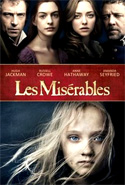 Although
from time to time in film history, musicals have disappeared or faced
periods of rejection (during the 1980s and 1990s), the decade of the
2010s was good to the genre. It had always been feared that Broadway
and theatrical adaptations couldn't be box-office hits or win major Oscar
awards, but the trends appeared to show that a new generation of millennials
were embracing musicals: Although
from time to time in film history, musicals have disappeared or faced
periods of rejection (during the 1980s and 1990s), the decade of the
2010s was good to the genre. It had always been feared that Broadway
and theatrical adaptations couldn't be box-office hits or win major Oscar
awards, but the trends appeared to show that a new generation of millennials
were embracing musicals:
- The Muppets (2011) and the sequel Muppets
Most Wanted (2014) - from Disney, the 7th and 8th theatrical films
featuring the Muppets; the two musical comedies featured the puppet
characters, and both were directed by James Bobin
- Les Misérables (2012) - from director
Tom Hooper, an epic and grand musical set in 19th century France, starring
Hugh Jackman (as ex-con Jean Valjean), Russell Crowe (as Inspector
Javert), and Best Supporting Actress Oscar-winning Anne Hathaway (Fantine),
based upon Victor Hugo's novel and the Broadway adaptation from 1980;
it was remarkable that the musical performers realistically sang their
lines live with no overdubbing, topped by Hathaway's iconic song "I
Dreamed A Dream" (filmed in one uninterrupted take)
- Into the Woods (2014) - a stunning, musical revisionist
fairy tale from director Rob Marshall, a Stephen Sondheim adaptation
starring Meryl Streep as the 'wicked witch,' and including many
classic characters from an ensemble of fairy tales
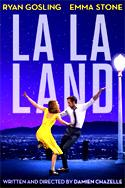 La La Land (2016) - a throw-back to classic
musicals or dance movies of Astaire and Rogers, by writer-director
Damien Chazelle and composer Justin Hurwitz, with popular stars Ryan
Gosling (as Sebastian) and Emma Stone (as Mia) in an unapologetically
romantic and fanciful film about star-crossed lovers; with colorful
set design and great choreography, it became a popular hit (at $151.1
million domestic), with a total of 14 Academy Award nominations and
6 Oscar wins (including Best Director, Best Actress, Best Cinematography,
Best Original Song ("City of Stars"), Best Original Score, and Best
Art Direction); it felt very modern, alive and up-to-date due to the
fact that it wasn't an adaptation of an existing Broadway musical,
or a period piece La La Land (2016) - a throw-back to classic
musicals or dance movies of Astaire and Rogers, by writer-director
Damien Chazelle and composer Justin Hurwitz, with popular stars Ryan
Gosling (as Sebastian) and Emma Stone (as Mia) in an unapologetically
romantic and fanciful film about star-crossed lovers; with colorful
set design and great choreography, it became a popular hit (at $151.1
million domestic), with a total of 14 Academy Award nominations and
6 Oscar wins (including Best Director, Best Actress, Best Cinematography,
Best Original Song ("City of Stars"), Best Original Score, and Best
Art Direction); it felt very modern, alive and up-to-date due to the
fact that it wasn't an adaptation of an existing Broadway musical,
or a period piece - Sing Street (2016) - a feel-good, coming-of-age
musical directed by John Carney and set in 1980s Dublin Ireland, about
an Irish teen who loved 1980s music and formed a rock band to impress
a troubled teen girl
- The Greatest Showman (2017) - a massive box-office
hit (at $174.3 million domestic), starring Hugh Jackman (as P.T.
Barnum) and Michelle Williams (as Charity Barnum); with one Oscar nomination
for Best Original Song ("This is Me") from Benj Pasek and Justin Paul
- Mary Poppins Returns (2018) - another great musical
hit (at $172 million domestic), from Disney (Buena Vista) - a sequel
(or loose remake of the original Mary
Poppins (1964)),
starring Emily Blunt as the title character
- Mamma Mia! Here We Go Again (2018), a sequel
set five years after the events of its predecessor, Mamma
Mia! (2008), at the occasion of the grand reopening of the Hotel
Bella Donna
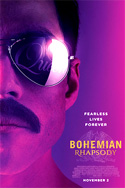 Bohemian Rhapsody (2018) - the highest-grossing
musical biopic of all-time (at $216.4 million domestic and $906.5 million
worldwide), with 5 Academy Award nominations and 4 wins (including
Best Actor for Rami Malek, Best Editing, Best Sound, Best Sound Editing),
directed by Bryan Singer; it told the story of the legendary rock band
Queen and lead singer Freddie Mercury (Malek), leading up to their
famous performance at Live Aid in 1985 Bohemian Rhapsody (2018) - the highest-grossing
musical biopic of all-time (at $216.4 million domestic and $906.5 million
worldwide), with 5 Academy Award nominations and 4 wins (including
Best Actor for Rami Malek, Best Editing, Best Sound, Best Sound Editing),
directed by Bryan Singer; it told the story of the legendary rock band
Queen and lead singer Freddie Mercury (Malek), leading up to their
famous performance at Live Aid in 1985 - A Star is Born (2018) - an R-rated, Warner Bros.
hit movie with 8 Academy Award nominations and one win for Lady Gaga's
Original Song "Shallow"; a modern-day remake of the oft-filmed story
- Rocketman (2019) - an Elton John musical fantasy-biopic
from Paramount Studios, starring Taron Egerton as Elton John
- Last Christmas (2019) - a UK romantic comedy
from Paul Feig (with songs by George Michael and Wham!), starring Emilia
Clarke and Henry Golding
Fewer Original Films - and Sequel-itis:
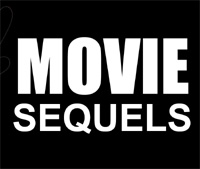 In the decade, there were fewer and
fewer one-off or original films - they were viewed as too risky or less
safe. Filmmakers
and studios were also being more careful about sensitive or offensive
subjects, especially after the hack of Sony by N. Korea in 2014 - thereby
causing some film ideas or projects to be either censored or heavily
edited. Because the multiplexes were crowded
with major franchise films, smaller, indie movies were being edged out
- and were appearing in other places, such as on Netflix and other VOD
services (without a theatrical release). In the decade, there were fewer and
fewer one-off or original films - they were viewed as too risky or less
safe. Filmmakers
and studios were also being more careful about sensitive or offensive
subjects, especially after the hack of Sony by N. Korea in 2014 - thereby
causing some film ideas or projects to be either censored or heavily
edited. Because the multiplexes were crowded
with major franchise films, smaller, indie movies were being edged out
- and were appearing in other places, such as on Netflix and other VOD
services (without a theatrical release).
Remakes and sequels (made in abundance) were often mediocre
efforts that only reshaped storylines, characters, and recognizable brands
that had already been successful, rather than investing in more original
works or new material. There was poor audience
response to the superfluous comedy Sex and the City 2 (2010) with
its extravagant stars not in the Big Apple but in the Middle East, or
the third episode of The Chronicles
of Narnia: The Voyage of the Dawn Treader (2010) that was received
only lukewarmly as another fantasy film with nothing special in it.
But it was clear why Hollywood studios were concentrating
on sequels and remakes as the centerpiece of their business. In 2011,
the top twelve films at the box-office (domestic) were all sequels, franchise
films, or continuations of previous films.
However, the downside was the creation of a dangerous
glut of remakes, new installments, or franchise sequels - unnecessary
and poorly done - and mostly flops or disappointing attempts, especially
by the year 2016:
|
The Year 2016: A Glut of Poor-Performing Remakes/Sequels
|
- Ghostbusters (2016)
- X-Men Apocalypse
(2016)
- Zoolander 2 (2016)
- Disney Re-Imaginings: Alice Through the Looking
Glass (2016)
- Neighbors 2: Sorority Rising (2016)
- The Huntsman: Winter's War (2016)
- The Divergent Series: Allegiant (2016)
- Independence Day: Resurgence (2016)
- Robert Langdon Series: Inferno (2016)
- Ben-Hur (2016)
- Barbershop: The Next Cut (2016)
- Teenage Mutant Ninja Turtles: Out of the Shadows
(2016)
|
[Note: There were, to be fair, a few exceptional
remakes or spin-offs in 2016, including: Deadpool
(2016) and Captain America: Civil War (2016).]
It was
no surprise, then that movie theater attendance in the US and
Canada in 2017 fell to a low point in the decade, with only
1.23 billion tickets sold (a drop off of 5.8% from the previous
year). And even with higher ticket prices, domestic revenue also dropped
2.7% from 2016, from $11.4 billion to $11.1 billion. (See earlier
discussion in Part 1).
One of the major reasons
for the decline of original programming was that mass audiences were
not supporting movies that were not sequels, remakes, reimaginings,
spinoffs or an adaptation of a young adult novel. For example, in 2016,
five of the top 10 domestic films were superhero films (or related franchise
films) that took in almost $2 billion - about 18% of the entire year's
box-office revenue.
Sequel and Franchise Craziness:
The decade spawned dozens of successful
derivative formats, including remakes (or reboots), sequels, prequels and
spin-offs in major franchises or film series.
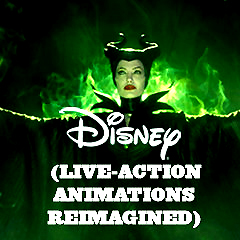 Special
attention should be paid to Disney's new strategy of reimagining (or
remaking) its classic animations from the past as live-action films.
In the decade of the 2010s, this marketing ploy really accelerated, with
five films premiering in 2019: Special
attention should be paid to Disney's new strategy of reimagining (or
remaking) its classic animations from the past as live-action films.
In the decade of the 2010s, this marketing ploy really accelerated, with
five films premiering in 2019:
- Alice in Wonderland (2010)
- Oz
the Great and Powerful (2013)
- Maleficent (2014)
- Cinderella (2015)
- The Jungle Book (2016)
- Alice Through the Looking
Glass (2016)
- Pete's Dragon (2016)
- Beauty and the Beast (2017)
- Dumbo (2019)
- Aladdin (2019)
- The Lion King (2019)
- Maleficent: Mistress of Evil (2019)
- Lady
and the Tramp (2019)
Also, with the release of Avengers: Endgame (2019),
the latest (third) phase of Marvel Studios' Marvel
Cinematic Universe essentially came to a close at the end of
the decade. The Three Phases (composed of the first 23 films) were known
as "The
Infinity Saga."
 Film History of the 2010s
Film History of the 2010s
Part 1, Part
2, Part 3, Part
4, Part 5

 
|

